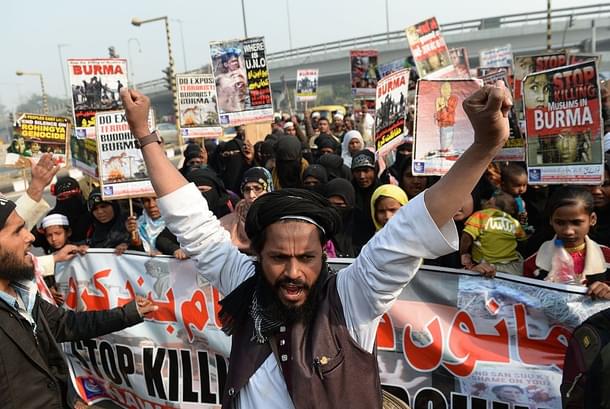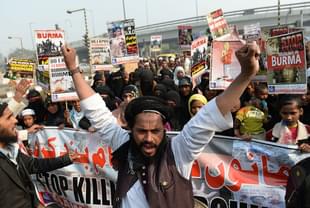Politics
Rohingya Issue: Why Deny It Is About Religion When Indian Muslims Have Made It So?
R Jagannathan
Sep 25, 2017, 12:11 PM | Updated 12:10 PM IST
Save & read from anywhere!
Bookmark stories for easy access on any device or the Swarajya app.


The Rohingya refugee issue – where the government wants to deport some 40,000 of them who are illegally staying in India claiming persecution in Myanmar – will never get resolved unless we call a spade a spade and stop trying to be politically correct.
While it is true that some Rohingyas may be security threats, it is highly unlikely that the vast majority of them are. The real issue is their religion, as self-styled “secular liberals” have been pointing out. While the government has been talking about deporting Rohingyas, its politically correct position has been given the lie not by the majority community, but by Indian Muslims. The threats, noisy street protests and aggressive postures have come almost entirely from Indian Muslims and Islamists, some of whom have gone to the extreme of threatening India and Indians on this issue.
Over the last one month, we have seen a Kolkata cleric threatening bloodshed in India, protests have been organised by Muslim organisations in Kerala, West Bengal and Uttar Pradesh, Kashmiri separatists have rallied for the Rohingya cause (but not their own kith and kin among Hindu pandits), a Kashmiri band has sung in sympathy with the Rohingyas, and Muslims abroad have been loudly orchestrating solidarity with their “persecuted” co-religionists. There has been no Muslim outrage anywhere in the world over Muslims being persecuted in Islamic countries, whether it is Pakistan, Bangladesh, Saudi Arabia, or Turkey or Iran and Iraq.
In short, it is Muslims in India and abroad who have formally communalised the Rohingya issue. We have not seen Hindu street protests in favour of deportation, except for some shrill voices on social media.
This is the outcome of India’s wishy-washy position on illegal immigration and refugees. To talk about deporting 40,000 Rohingyas is fantasy, not least when we have been unable to do anything about deporting millions of illegal Bangladeshis, who have not only destabilised our north-east, but also spread out all over India and quietly inserted themselves into voters’ lists and subsidy systems.
Let’s be clear: deportation is not an option right now, for deportation presumes cooperation on the part of the Myanmar government. We can push a few hundred Rohingyas across the border, but we do not have the means to stop them from coming over again through another section of the porous border and melting quietly into India’s Muslim ghettos. This is what happened with Bangladeshi Muslims, who came in as economic refugees, and were not the targets of any political oppression back home. On the contrary, rogue Islamists, who are threatening the Bangladeshi government are being provided shelter in West Bengal.
If we want to deal with the issue, we need to be clear about our objectives, and morally and legally support our positions. We need to acknowledge the following:
One, we must and should give priority for refugee status, immigration rights and citizenship to persecuted minorities among Indic religions, not Muslims. This may sound illiberal, but consider this question: how many Hindu/Indic countries are there in the world, and how many Christian and Muslim ones? How can it be India’s priority to try and treat everyone equally, when India is the ultimate guarantor of the life, liberty and religious rights of Hindus, Sikhs, Buddhists, Jains, and a number of smaller tribal and other faiths originating in India? While some non-Indian Buddhists may yet find some Buddhist countries willing to take them in small numbers, and Christian refugees in the west, only India can accommodate, peacefully assimilate and help Hindu, Sikh and Jain refugees by the lakhs and millions. India has to retain its special relationship as guarantor of the rights of members of Indic faiths first.
Two, does this mean we should not take in genuine Muslim refugees from our neighbouring countries? No, but they are second priority. We need to be clear that they will always be refugees, and will not be given citizenship or voting rights. They should be first priority for Islamic countries who loudly comment on alleged Muslim persecution in India. Since this won’t happen, these refugees have to go back to their countries of origin at some point. Thus, if Pakistani Ahmaddiyas, Bahais, Shias or Christians turn up in India as refugees, we can shelter them in camps and ask the United Nations to provide the wherewithal for feeding and taking care of them; but they should not expect to become citizens or be treated as Indians.
However, children born to them on Indian soil can become Indian voters and citizens. This should force India to think clearly. If we do not want to add to refugees making India their permanent home, we need to make it possible for them to return to their country of origin within five or 10 years. Or the problem will become insoluble. We have broadly adopted the right strategy of seeking to invest in Rakhine state of Myanmar, and we could do so in Bangladesh too, so that the economic incentive to cross borders is lower.
Three, there is the question of economic refugees – mostly from Bangladesh. We cannot deport them even if we want to. The only logical way forward is to identify them and remove them from voters’ lists. We also need to make a change in our citizenship laws. An illegal Bangladeshi immigrant who is discovered today should be deemed to have entered the country on the date of detection, and not the date he got himself into voters’ lists or obtained a ration card. This will allow us to postpone the issue of giving him citizenship by naturalisation at a later date, though his children born in India will remain citizens by birth.
We talk about Rohingyas being a threat to security, but millions of Bangladeshis who are directly impacting our politics are being seen as no threat by our “liberals”. The US went ballistic when Russians allegedly tried to influence their elections by hacking into sensitive emails, but in India we actively encourage illegals to vote and distort elections.
To sum up, we must be clear that India needs to prioritise the interests of minorities among Indic religions who are persecuted in the neighbourhood or who have to seek economic upliftment in India. This is the logic of our allowing the Nepalese to live and work here, but not Bangladeshis. The last thing we need is to import trouble by treating all religious refugees as equal. India does not owe this to the world or itself.
The government’s decision to amend the Citizenship Act and to grant permanent stay visas to the Buddhist, Hindu, Christian and Sikh refugees who came to India illegally before December 2014, due to persecution in the neighbouring countries, is the right one. It could also cover some of the Muslim minorities in Pakistan, but as a second priority. The “secular liberal” attempt to muddy the waters by pretending that Muslims from neighbouring countries deserve the same treatment is wrong. If Muslims are persecuting Muslims, they should be busy fighting these wrongs in their countries, not from India.
What India should not do is try and equate the rights of genuinely persecuted minorities like the Hindus, Chakmas or Hajongs of the neighbourhood with those of Bangladeshi, Pakistani or Myanmar Muslims. The latter can be given temporary refuge, but with no presumption of ultimate citizenship.
Jagannathan is former Editorial Director, Swarajya. He tweets at @TheJaggi.





